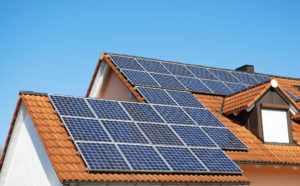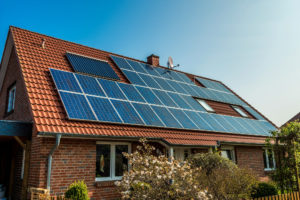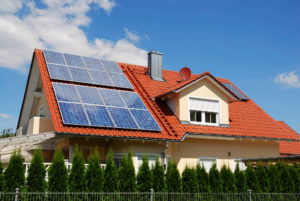Solar panels have revolutionized how we harness energy by tapping into the abundant power of the sun. These photovoltaic marvels offer a versatile solution for various applications, from residential to commercial, agricultural to space exploration. In this article, we will delve into the various uses of solar panels, highlighting their benefits and shedding light on their immense potential in shaping a sustainable future.
Contents
- 1 Key Takeaways
- 2 Solar Panels for Residential Applications
- 3 Solar Panels for Commercial and Industrial Applications
- 4 Solar Panels for Agriculture and Farming
- 5 Solar Panels for Transportation and Vehicles
- 6 Solar Panels in Public Infrastructure
- 7 Solar Panels for Water Heating and Desalination
- 8 Solar Panels in Space Exploration
- 9 Solar Panels for Humanitarian and Emergency Relief Efforts
- 10 Case Study: Diverse Applications of Solar Panels
- 11 Expert Insights From Our Solar Panel Installers About What Solar Panels Are Used For
- 12 Experience Solar Excellence with Us!
- 13 Conclusion
Key Takeaways
- Solar panels offer diverse applications, powering residential homes, commercial buildings, transportation, and space exploration.
- Solar energy provides numerous benefits, including cost savings, reduced environmental impact, and energy independence.
- From promoting sustainability in agriculture to supporting humanitarian efforts, solar panels are a versatile and vital solution for a brighter, cleaner future.
Solar Panels for Residential Applications
Powering Homes with Solar Energy
Residential solar panels are popular as homeowners embrace clean, renewable energy sources. By installing solar panels on rooftops, households can harness the sun’s energy to power their homes. These panels are composed of numerous solar cells, typically made of silicon, which convert sunlight into direct current (DC) electricity through the photovoltaic effect.
Benefits of Residential Solar Panels
Solar panels offer homeowners a myriad of benefits. Firstly, they help reduce electricity bills significantly. As the panels generate electricity, households can rely less on traditional grid-supplied power, leading to substantial cost savings over time. Additionally, solar power contributes to reducing greenhouse gas emissions, as it is a clean and renewable energy source. By adopting solar panels, homeowners actively participate in mitigating climate change.
Off-Grid Living and Remote Power Solutions
Solar panels have also become a lifeline for off-grid living and remote locations. Solar power provides a reliable alternative in areas where connecting to the electrical grid is impractical or expensive. Off-grid households can use solar panels to generate electricity and store it in batteries during nighttime or cloudy days. This enables self-sufficiency and independence from traditional energy sources, empowering individuals and communities to thrive in even the most remote locations.
Solar Panels for Commercial and Industrial Applications
Solar Power for Businesses and Industries
Businesses and industries are increasingly adopting solar panels as a means to reduce operating costs and environmental impact. Commercial buildings can install solar panels on rooftops or construct solar carports to generate clean energy. This lowers electricity bills and demonstrates a commitment to sustainability, which resonates with environmentally conscious customers.
Case Studies: Successful Integration of Solar Panels in Commercial Settings
Numerous success stories highlight the efficacy of solar panels in commercial applications. For instance, large retail chains have installed solar panels across their store rooftops, generating significant amounts of renewable energy to power their operations. Likewise, manufacturing plants have leveraged solar power to reduce their reliance on fossil fuels and decrease their carbon footprint. These real-world examples illustrate how solar panels offer viable and profitable solutions for various commercial and industrial sectors.
Reducing Operational Costs and Environmental Footprint
Businesses and industries can significantly reduce their operational costs by harnessing solar power. Solar panels provide a reliable and consistent energy source, mitigating the impact of fluctuating energy prices. Moreover, solar power helps reduce greenhouse gas emissions, contributing to corporate sustainability goals and environmental stewardship. By embracing solar panels, companies can align their economic interests with their commitment to a greener future.

Solar Panels for Agriculture and Farming
Solar-Powered Irrigation Systems
Agriculture and farming can benefit immensely from solar panels, particularly in regions with abundant sunlight. Solar-powered irrigation systems eliminate the need for traditional fossil fuel-powered pumps, reducing costs and environmental impact. Solar panels provide a continuous and sustainable energy source to pump water for crop irrigation, enabling efficient and eco-friendly farming practices.
Farming Applications: Greenhouses and Aquaponics
Solar panels are also widely utilized in greenhouse operations. These panels power lighting, heating, and ventilation, ensuring optimal plant growth conditions. Additionally, aquaponics, a sustainable farming method combining aquaculture and hydroponics, often relies on solar panels to provide energy for water pumps and aeration systems. Solar-powered farming practices promote resource efficiency, reduce reliance on non-renewable energy sources, and facilitate the cultivation of fresh produce in urban and remote areas.
Solar Energy for Rural and Remote Areas
Solar panels can be a game-changer in rural and remote areas where access to electricity is limited. They provide a cost-effective, environmentally friendly solution for electrifying homes, schools, and community centers. Solar panels and energy storage systems ensure a reliable and sustainable power source for daily activities and enhance the overall quality of life in these underserved areas.
Solar Panels for Transportation and Vehicles
Solar-Powered Electric Vehicles (EVs)
Solar panels play a pivotal role in the advancement of electric vehicles (EVs). Integrated solar panels on the roof or body of an EV can harness sunlight to charge the vehicle’s battery, extending its range and reducing the need for external charging. This innovative application of solar panels enhances the efficiency and sustainability of EVs, paving the way for cleaner and greener transportation.
Solar Charging Stations and Infrastructure
Solar panels also power charging stations for electric vehicles. These stations utilize solar energy to charge multiple vehicles simultaneously, promoting the growth of the EV market while minimizing the strain on the electrical grid. Solar-powered charging infrastructure enables convenient and sustainable travel, accelerating the transition to a greener transportation system.
Advancements in Solar-Powered Transportation
Beyond EVs, solar panels are being explored for use in other modes of transportation. Solar-powered boats and aircraft are emerging as promising alternatives to traditional fossil fuel-powered vessels. By harnessing the sun’s energy, these innovative transportation solutions offer lower operating costs, reduced environmental impact, and increased energy independence.

Solar Panels in Public Infrastructure
Solar-Powered Streetlights
Public infrastructure can benefit from solar panels, particularly in the form of solar-powered streetlights. These streetlights harness sunlight during the day, storing the energy in batteries and illuminating the streets at night. Solar-powered streetlights enhance visibility and safety while reducing electricity consumption and greenhouse gas emissions.
Solar-Powered Traffic Signs
Solar panels can also power traffic signs, offering a sustainable and cost-effective solution. Solar-powered signs eliminate the need for grid connections and wiring, making them suitable for remote locations and reducing installation costs. By relying on solar energy, traffic signs become independent, reliable, and environmentally friendly, contributing to safer roadways.
Renewable Energy Solutions for Public Facilities
Public facilities such as schools, hospitals, and government buildings can integrate solar panels to generate renewable energy and reduce their reliance on the electrical grid. Solar arrays on these buildings’ rooftops or surrounding areas provide a clean and sustainable power source, enabling them to function more efficiently and with reduced environmental impact.
Solar Panels for Water Heating and Desalination
Solar Water Heating Systems
Solar panels can be utilized for water heating systems, providing an energy-efficient alternative to traditional water heaters. Solar water heating systems utilize the sun’s energy to heat water for residential and commercial use. These systems reduce electricity or gas consumption by converting sunlight into thermal energy, resulting in significant energy savings.
Solar-Powered Desalination Plants
Desalination, the process of converting seawater into freshwater, typically requires considerable energy. Solar-powered desalination plants offer an environmentally friendly solution by utilizing solar panels to generate the necessary energy for desalination. This sustainable approach reduces reliance on fossil fuels, conserves water resources, and addresses global water scarcity challenges.
Tapping into Solar Energy for Water Sustainability
Integrating solar panels in water heating and desalination systems promotes water sustainability. By harnessing the sun’s energy, these systems reduce the carbon footprint associated with water-related processes. Solar-powered water solutions present a viable and eco-friendly approach to address water needs in various contexts, from individual households to large-scale industrial applications.

Solar Panels in Space Exploration
Solar Panels on Satellites and Spacecraft
Space exploration heavily relies on solar panels for power generation. Satellites and spacecraft are equipped with solar arrays of numerous solar cells that convert sunlight into electricity. These solar panels are vital for providing continuous power supply during missions in space where traditional power sources are unavailable.
Enabling Long-Duration Missions with Solar Power
Solar panels play a crucial role in enabling long-duration space missions. By capturing the sun’s energy, these panels provide a sustainable and reliable power source for scientific experiments, communication systems, and life support equipment. Solar power allows spacecraft to operate efficiently and explore the depths of our universe for extended periods, furthering our understanding of space.
Solar Energy for Lunar and Martian Colonies
Plans for lunar and Martian colonies heavily rely on solar panels to generate the necessary energy for human habitation. The abundant sunlight on these celestial bodies offers an ideal environment for harnessing solar power. Solar panels will power life support systems, research facilities, and infrastructures critical to sustainable space exploration and colonization.
Solar Panels for Humanitarian and Emergency Relief Efforts
Portable Solar Panels for Disaster Response
In the wake of natural disasters and emergencies, access to electricity is often disrupted. Portable solar panels are a valuable resource for disaster response teams and humanitarian organizations. These lightweight and compact panels can be deployed quickly, providing immediate power for essential services, communication, and medical equipment, thereby aiding relief efforts.
Solar-Powered Medical Facilities
Solar panels are also utilized in solar-powered medical facilities, especially in remote and underserved areas. These facilities can operate independently of the electrical grid, ensuring access to critical medical services even in resource-constrained settings. Solar-powered medical facilities contribute to improved healthcare delivery and potentially save lives in challenging environments.
Bringing Clean Energy to Underserved Communities
Solar panels are instrumental in bringing clean energy to underserved communities worldwide. Solar panels empower individuals and communities by providing access to affordable and sustainable electricity, promoting economic development, education, and improved quality of life. Solar initiatives transform the energy landscape, bridge the energy gap, and foster social and environmental progress.
Case Study: Diverse Applications of Solar Panels
Background
At Solar Panels Network USA, we are dedicated to showcasing the versatility and potential of solar panels across various sectors. Our commitment to sustainability drives us to explore innovative applications that harness the power of the sun, ensuring a cleaner and greener future. This case study highlights some of the diverse uses of solar panels, demonstrating their impact on different industries and communities.
Project Overview
Our projects span multiple sectors, including residential, commercial, agricultural, transportation, and public infrastructure. Each project aims to leverage solar technology to address specific energy needs, reduce environmental impact, and promote sustainability.
Implementation
Residential Applications
- Powering Homes with Solar Energy: We installed solar panels on residential rooftops, allowing homeowners to generate their own electricity. This not only reduced their electricity bills but also contributed to a significant reduction in greenhouse gas emissions. The use of high-efficiency monocrystalline panels ensured optimal energy conversion and long-term performance.
- Off-Grid Solutions: For clients in remote areas, we provided off-grid solar systems with battery storage. These systems enabled continuous power supply even during cloudy days and nighttime, fostering energy independence and self-sufficiency.
Commercial and Industrial Applications
- Solar Power for Businesses: We worked with several businesses to install solar panels on their buildings and solar carports. These installations helped reduce operational costs and showcased the companies’ commitment to sustainability. For example, a large retail chain installed solar panels across multiple locations, significantly cutting down on electricity costs and reducing their carbon footprint.
- Case Studies: In manufacturing plants, solar panels were used to power machinery and lighting, demonstrating substantial energy savings and a decrease in reliance on fossil fuels. This integration not only supported corporate sustainability goals but also provided a competitive edge in the market.
Agricultural and Farming Applications
- Solar-Powered Irrigation Systems: We deployed solar-powered pumps for irrigation in farms, eliminating the need for fossil fuel-based pumps. This transition not only reduced operational costs but also supported eco-friendly farming practices.
- Greenhouses and Aquaponics: Solar panels were installed in greenhouses to power lighting, heating, and ventilation systems, ensuring optimal conditions for plant growth. In aquaponic systems, solar energy powered water pumps and aeration, promoting sustainable agriculture in urban and rural settings.
Transportation Applications
- Solar-Powered Electric Vehicles (EVs): We integrated solar panels on the roofs of electric vehicles to extend their range and reduce the need for frequent charging. This innovation enhanced the sustainability and efficiency of EVs, contributing to a cleaner transportation system.
- Solar Charging Stations: We established solar-powered charging stations for electric vehicles, providing a renewable energy source for EV users. These stations supported the growth of the EV market and reduced the strain on the electrical grid.
Public Infrastructure
- Solar-Powered Streetlights: In urban areas, we installed solar-powered streetlights that harnessed sunlight during the day and provided illumination at night. This reduced electricity consumption and enhanced public safety by ensuring well-lit streets.
- Solar-Powered Traffic Signs: We implemented solar-powered traffic signs, offering a cost-effective and sustainable solution for remote locations. These signs operated independently of the grid, reducing installation and maintenance costs.
Results
- Energy Efficiency and Cost Savings: Across all sectors, the implementation of solar panels resulted in significant energy efficiency and cost savings. Homeowners, businesses, and public entities benefited from reduced electricity bills and a decreased reliance on non-renewable energy sources.
- Environmental Impact: The use of solar panels contributed to a substantial reduction in greenhouse gas emissions, supporting global efforts to combat climate change. Each project demonstrated a commitment to sustainability and environmental stewardship.
- Enhanced Sustainability: Solar panels promoted energy independence and sustainability across various applications. From residential homes to public infrastructure, solar energy provided a reliable and renewable power source, fostering a cleaner and greener future.
Summary
This case study highlights the diverse applications of solar panels and their transformative impact on various sectors. Solar Panels Network USA successfully implemented solar solutions that enhanced energy efficiency, reduced costs, and promoted sustainability. By leveraging the versatility of solar technology, we continue to support the transition to renewable energy and a more sustainable future.
Expert Insights From Our Solar Panel Installers About What Solar Panels Are Used For
Solar panels have truly revolutionized how we think about energy. From residential rooftops to large-scale commercial installations, the versatility and efficiency of solar technology make it a go-to solution for anyone looking to reduce their carbon footprint and save on energy costs.
Senior Solar Engineer
Incorporating solar panels in agriculture has been a game-changer. Solar-powered irrigation systems and greenhouses enable farmers to be more sustainable and self-sufficient, especially in remote areas where access to the grid is limited.
Agricultural Solar Specialist
Solar panels in transportation, particularly in electric vehicles and solar charging stations, are paving the way for a cleaner, more sustainable future. These innovations not only reduce greenhouse gas emissions but also promote energy independence.
Transportation Solar Expert
Experience Solar Excellence with Us!
Trust in Solar Panels Network USA, where our seasoned experts deliver top-quality solar solutions for homes and businesses nationwide. With a legacy of countless successful installations and a commitment to sustainable energy, we’re your reliable partner in the solar journey. Ready for a brighter, eco-friendly future? Call us now at (855) 427-0058 and harness the power of the sun!
Conclusion
Solar panels offer a multitude of uses across various sectors, revolutionizing how we generate and utilize energy. Solar panels have proven to be a versatile and indispensable technology, from powering residential homes to fueling commercial enterprises, enabling sustainable agriculture to propel transportation, and supporting space exploration and humanitarian efforts. By embracing solar power and harnessing the limitless potential of the sun, we can build a cleaner, greener, and more sustainable future for generations to come.
About the Author
Solar Panels Network USA stands at the forefront of solar energy solutions, driven by a team of seasoned solar engineers and energy consultants. With over decades of experience in delivering high-quality solar installations and maintenance, we are committed to promoting sustainable energy through customer-centric, tailored solutions. Our articles reflect this commitment, crafted collaboratively by experts to provide accurate, up-to-date insights into solar technology, ensuring our readers are well-informed and empowered in their solar energy decisions.

